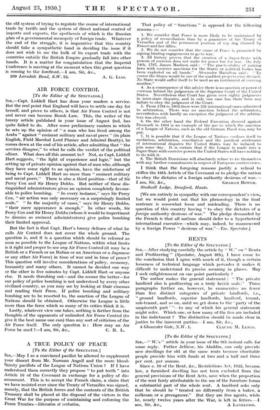AIR FORCE CONTROL [To the Editor of the SPECTATOR.] SIR,—Capt.
Liddell Hart has done your readers a service. But the real point that England will have to settle one day for herself, and prove to others, is that Air Force Control is not and never can become Bomb Law. This, the writer of the breezy article published in your issue of August 2nd, has quite failed to do. After some preliminary canters in which he sets up the opinion of " a man who has lived among the Arabs " against " eminent military and naval peers " (in plain English, Field Marshal Lord Plumer and Admiral Beatty), he comes down at the end of his article, after admitting that " the services disagree," to what he calls the verdict of the political officer. What does all this amount to? Not, as Capt. Liddell Hart suggests, "the light of experience and logic," but the setting up of private opinion against that of men who. although they have some right to an opinion, have the misfortune of being to Capt. Liddell Hart no more than " eminent military and naval peers." There is also a third position—that of Sir Percy Cox and Sir Henry Dobbs. But neither of these dis- tinguished administrators gives an opinion completely favour- able to police bombing. " In every instance," says Sir Percy Cox, " air action was only necessary on a surprisingly limited scale." " In the majority of cases," says Sir Henry Dobbs, " their mere appearance is enough." In other words, Sir Percy Cox and Sir Henry Dobbs (whom it would be impertinent to dismiss as eminent administrators) give police bombing their limited approval.
But the fact is that Capt. Hart's breezy defence of what lie calls Air Control does not cover the whole ground. The question is, and it is a question which should be referred as soon as possible to the League of Nations, within what limits is it right and proper to use any Air Force Control (it may be a British or a French or an Italian or an American or a Japanese or any other Air Force) in time of war and in time of peace? This question will involve considerations of policy, economy, humanity and many others. It cannot be decided one way or the other in five minutes by Capt. Liddell Hart or anyone else. It needs threshing out—and the sooner the better—for our policy of police bombing is not understood by every other civilized country, as you may see by looking at their cinemas and reading their Press. If police bombing and military bombing are to be resorted to, the sanction of the League of Nations should be obtained. Otherwise the League is little more than the farce which so many of its critics think it is.
Lastly, whatever view one takes, nothing is farther from the thoughts of the opponents of unlimited Air Force Control (to give it the best name one can) than any sort of criticism of the Air Force itself. The only question is : How may an Air Force be used ?—I am, Sir, &c., C. R. L.
































 Previous page
Previous page